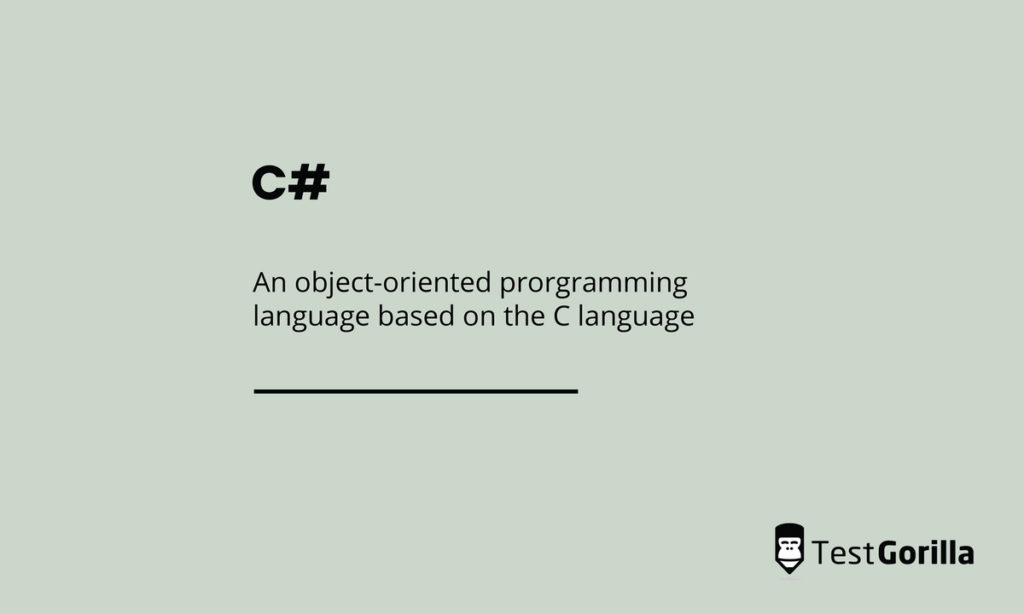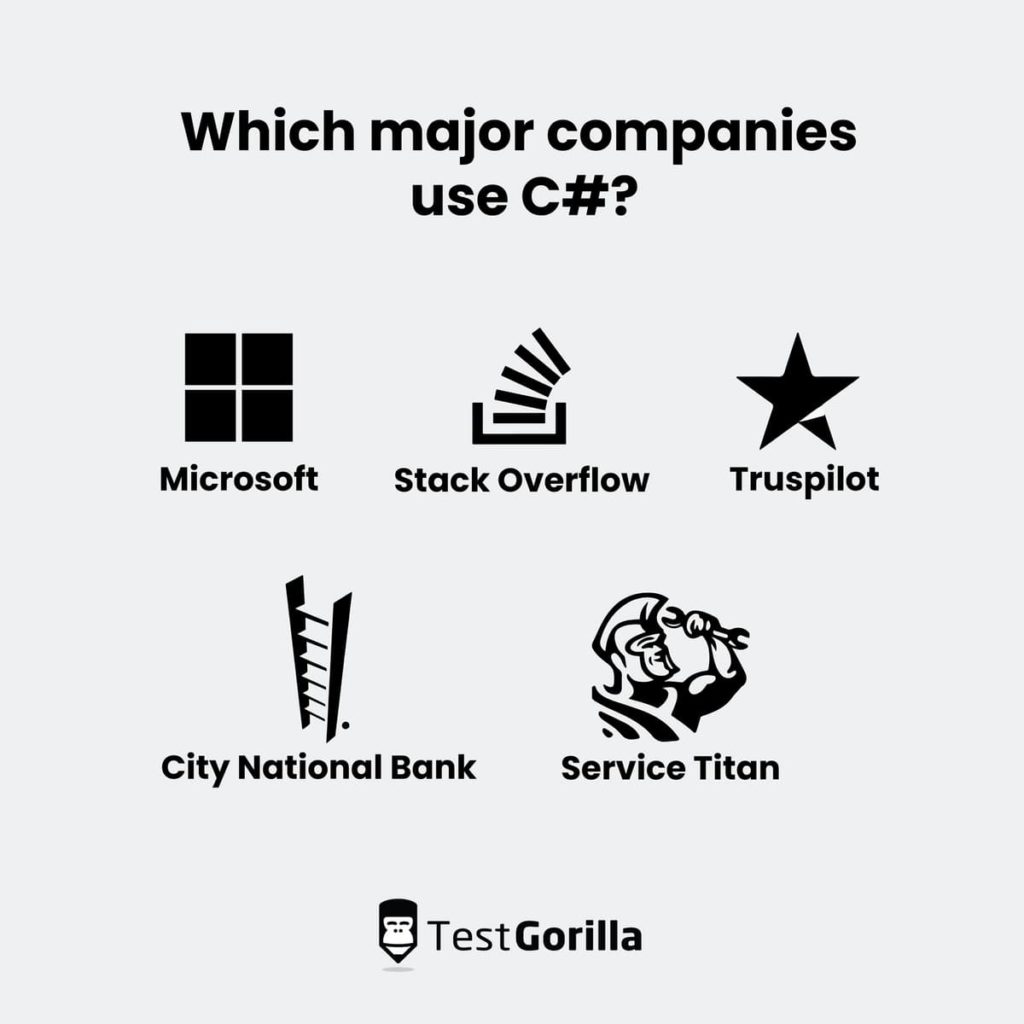Are you a non-technical recruiter confused about what C# is used for? If you are, it can be challenging to understand what C# is and why many developers and programmers use it.
Knowing this programming language’s main uses can help you narrow down the list of C# skills you’re looking for when hiring a developer.
Good news – we’ve got the answers you need. This article will explain what C# is useful for and which companies use the language for their projects.
Table of contents
- What is the C# language?
- What is C# used for?
- When was C# created?
- Which major companies use C#?
- Which industries use C# and for what purposes?
- How popular is the C# programming language?
- A deep dive into the uses of C#
- What are the advantages of using C# for projects?
- Use your C# knowledge to hire an expert C# developer
What is the C# language?
C# is an object-oriented programming language, and it was built based on the C language.
The C programming languages feature static typing, and they are class-based and component-oriented.
Your programmers familiar with C++ and C should recognize the C# programming language; it’s open-source and popular among developers.
What is C# used for?
Some of the C# uses that your developers should be aware of include:
Desktop application development
Web application and service creation
Microsoft application development
Game development
C# can also be used for mobile application development and cloud-based service development. It is considered a multi-purpose programming language due to its flexibility.
The best insights on HR and recruitment, delivered to your inbox.
Biweekly updates. No spam. Unsubscribe any time.
When was C# created?
If you’re wondering when this popular programming language was created, the short answer is that Microsoft built the C# programming language in 2000. Two years later, the ECMA approved the language as an international standard.
Which major companies use C#?
Plenty of major companies use the C# programming language, some of which include:
Microsoft: Microsoft software engineers use C#, as do innovators and specialists working on Azure application developments
Stack Overflow: Stack Overflow’s backend engineers use the programming language
Trustpilot: Trustpilot’s full-stack and senior front-end engineers use C#
Service Titan: Service Titan’s lead android developers use the language, as do DevOps engineers
City National Bank: Program analysts and senior, full-stack engineers at City National Bank use C#
Which industries use C# and for what purposes?
Did you know that many industries use C# for a variety of purposes, such as application building?
Here are just a few of the things C# is used for in the companies listed above that you should be aware of:
Microsoft uses C# for web and game development
Stack Overflow uses C# for app development and web services
Trustpilot uses C# for web services and app development
Service Titan uses C# for web services and android app development
City National Bank uses C# for building cloud-based applications
How popular is the C# programming language?
The popularity of C# is increasing significantly – it is currently considered the 6th most popular programming language after Python, Java, C, C++, and JavaScript.
Many programmers have recognized the variety of C# uses and are busy building C# applications. The programming language is in high demand, and you may even encounter difficulties when searching for available and qualified developers.
A deep dive into the uses of C#
Let’s now look at the specific C# uses and explore why this programming language is so popular.
Some of the most important C# uses that enterprises benefit from include web app development, game development, workflow applications, and Windows services.
1. C# and web application development
Over the years, the C# programming language has been adopted for web and web app development. Some examples of web applications built using C# include Windows Installer XML, Microsoft Visual Studio, and FlashDevelop.
Enterprises are turning to C# for web applications because of its scalability, ease of maintenance, and object-oriented status.
2. Game development and C# uses
If you want to know the top answer to the question “what is C# good for?” – it’s considered the ideal programming language for developing games. For example, the games featured on the Unity Game Engine are made with C#.
Developers build games with C# because of the seamless integration of C# and the Unity Game Engine.
3. C# for workflow applications
Your developers can use C# for workflow applications, which are types of task automation software. Most C# workflow apps use the .NET open-source developer platform but require C# for the development stage. Developers must install Visual Studio to build workflow app software.
4. C# for Windows services
Programmers can also use C# to create web services such as Windows services, which are communication-supporting software that facilitate interactions via networks.
What are the advantages of using C# for projects?
Using C# for your projects has the following benefits:
Speedy development of projects
High scalability for programs
A large community of developers ready to support
1. Faster development time for projects
C# has unique features that make coding faster for your developers than other programming languages. These include:
An extensive library
A static-typed language
A language that is easy to read
2. High scalability for programs
Do your developers need to increase the functionality of your program? C# enables them to scale and change the C# program due to its static coding features.
3. Huge community support
If your developers need a helping hand with the C# programming language, the huge community support will assist them. It’s a Microsoft product that offers professional support.
Use your C# knowledge to hire an expert C# developer
There’s no question that understanding C# can seem daunting for non-technical recruiters. But understanding the programming language’s main benefits, advantages, and uses can help you hire an expert developer for your organization. It also helps if you ask them the right C# interview questions during interviews.
Keep in mind the main C# uses and create a list of skills your applicants should have for the open role. Then you can test them using a skills-testing platform like TestGorilla – and you’ll soon hire the best C# developer for your enterprise to complete those critical projects.
Get started for free today and start making better hiring decisions, faster and bias-free.
You've scrolled this far
Why not try TestGorilla for free, and see what happens when you put skills first.





















